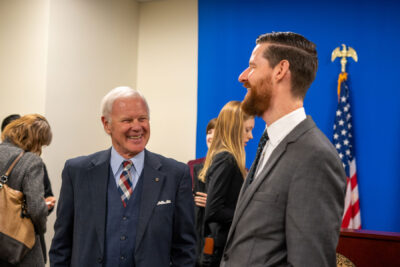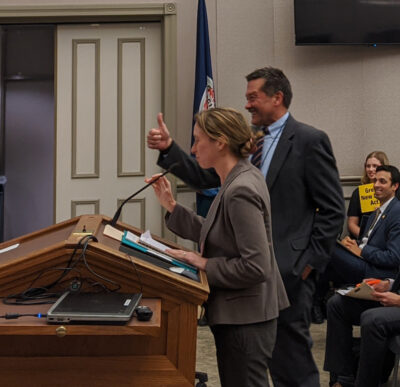
Del. Lee Ware (l) and Appalachian Voices’s Peter Anderson at the press conference introducing the Virginia Energy Reform Act.
For far too long, Virginia has lagged behind in embracing advances in clean energy that have taken hold in many other parts of the country and world. The state’s electric monopolies, through aggressive political contributions, kept a tight grip on policy-making to ensure big profits for their shareholders at the public’s expense — jeopardizing clean air, clean water, a stable climate and affordable energy for all Virginians.
With the end of the 2020 General Assembly session earlier this month, Virginia is in the midst of an historic shift.
Appalachian Voices, along with many partners and community members, has been pressing for changes for more than a decade in Virginia, fighting to stop new coal plants and gas pipelines and advocating for policies to advance solar and wind power, energy efficiency and fair pricing. We have helped build the power of grassroots coalitions working for clean energy and environmental justice and called for top-to-bottom utility reform.
The public’s rising intolerance for “business as usual” helped to transform the House and Senate last year, with energy policy being a key driver. Despite record-breaking campaign contributions by Dominion Energy, the largest electric monopoly in the state, Virginians elected nearly 50 candidates who pointedly refused monopoly utility money. Moreover, many veteran members of the General Assembly have grown deeply troubled by Dominion’s heavy-handed tactics to gouge their constituents through increasing monthly electric bills.
The stage was set for major advances, and Appalachian Voices invested substantial resources to seize this critical moment. Thanks in part to strong collaborations with partners, critical engagement by our members and supporters, and focused work by several veteran and freshman legislators, we scored numerous victories in this year’s legislature.
Solar energy
Appalachian Voices has worked with partners across the commonwealth for several years to increase access to solar energy for individuals, small businesses, schools and nonprofit institutions. This means removing limits on rooftop solar pushed by monopoly utilities and doing more to make the shift to clean energy affordable.
Bills currently headed to the governor’s desk for signature will accomplish both.
We have long advocated for expanding access to a common solar-financing tool known as a power purchase agreement (PPA). PPAs allow people to avoid the upfront cost of a new solar installation. As a result of our efforts, the existing PPA program will be expanded for Dominion Energy and Appalachian Power customers, and the law will establish the first-ever PPA program for Old Dominion Power customers in Southwest Virginia.

Chelsea Barnes of Appalachian Voices lobbies in Richmond, Va., for a program to incentivize solar development on former mine and industrial sites, as Del. Terry Kilgore (R-1) looks on in support.
Another important way to increase access to solar — especially for people living in apartments — is to allow multiple customers to be served by a common solar facility. Bills that passed this year include a shared solar program for customers who live in multi-family buildings in Dominion Energy and Old Dominion Power territory. Unfortunately, those same bills do not include a shared solar program for Appalachian Power’s customers.
Environmental justice
As a founding member of the Virginia Environmental Justice Collaborative, Appalachian Voices has long advocated for a citizen advisory council on environmental justice. With bipartisan support in the Senate this year, the council will finally be codified as a permanent body under Virginia law — and it will be funded.
Appalachian Voices and our partners pushed even further, however, to ensure that the principles of environmental justice are embedded throughout Virginia’s state government. With passage of the Virginia Environmental Justice Act, we now have the beginnings of a legal framework to accomplish this. The law declares that it is the policy of our state government to promote environmental justice and ensure it is carried out throughout the commonwealth.
A fair and equitable transition to clean energy
Here at Appalachian Voices, we believe that protecting the environment and responding to the climate crisis are tied inextricably to creating economic opportunities for workers in the new clean energy economy and ensuring that the people most impacted by climate change do not also disproportionately pay for climate solutions. As Virginia rapidly increases investments in clean energy resources, it is paramount that the energy system be regulated and operated in a manner that best serves the public interest, as opposed to the interests of large companies’ shareholders. We brought this justice and equity lens to our work in the General Assembly session this year, as always. We elicited unprecedented traction here and the results were positive, though much work on this front remains.
First, we have long supported Virginia’s efforts to join the Regional Greenhouse Gas Initiative, or RGGI, which is a regional market for reducing carbon pollution. The bill that passed this year was substantially better than versions introduced in the past, directing a minimum 50% of state revenues received from the program towards energy efficiency investments for low-income people.
Next, as legislators contemplated the far-reaching omnibus Virginia Clean Economy Act, we worked closely with them to ensure that any increased costs to the average electricity bill would be mitigated. This advocacy revolved largely around promoting the Fair Energy Bills Act, which would have restored the State Corporation Commission’s traditional authority to set electricity rates for Dominion’s customers at a fair and proper level. (The SCC has estimated Dominion over-collected hundreds of millions of dollars from its customers each of the last several years.) Many legislators came to view passage of the bill as a prerequisite for passing the Virginia Clean Economy Act and other bills that would authorize large investments in offshore wind.
Unfortunately, after passing the Virginia House of Delegates on a strong bipartisan vote of 77-23, the Fair Energy Bills Act was killed by the Senate Commerce and Labor committee by a single vote. However, our efforts didn’t stop here.
A broad coalition of environmental and public interest advocates including Appalachian Voices won a very important policy victory that accomplishes part of what the Fair Energy Bills Act would have done. House Bill 528, which restores the State Corporation Commission’s authority to protect ratepayers from increased costs due to early power plant retirements, is on its way to the governor’s desk.
Moving forward
2020 was very clearly a banner year for clean energy policy in Virginia’s General Assembly, with lawmakers embracing investments in clean energy technologies, carbon reduction, removing barriers to distributed solar and even restoring some authority to our monopoly utilities’ regulator, the SCC.
Our work, however, is far from finished. As Appalachian Voices and our partners plan for the 2021 legislative session, we will continue our focus on those areas of Virginia energy policy that fail our communities. This includes policies that place too much control in the hands of monopoly utilities and hold back Virginians’ ability to own their own clean energy resources or lower their electric bills.



Leave a Reply